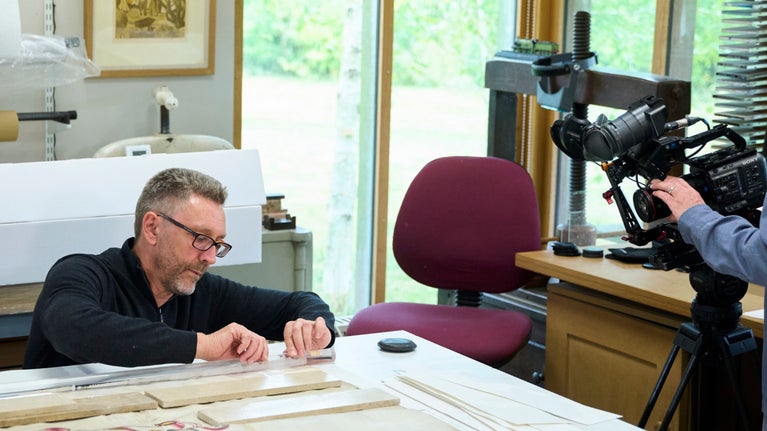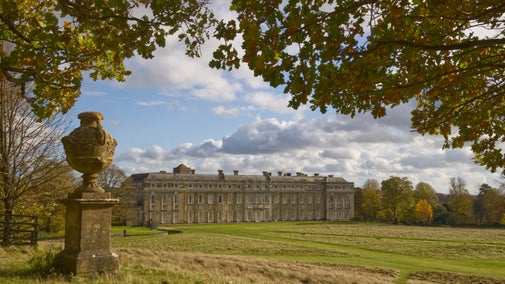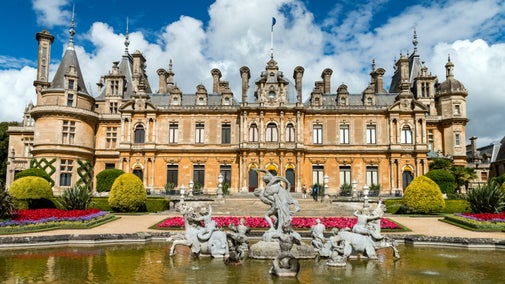
Stars of the screen
Find out which historic houses and dramatic landscapes you can see on-screen, from popular TV dramas to brand new films.

Shipwrecks, sinister servants, a mysterious death and a sprawling ancestral estate – no wonder Daphne du Maurier’s 1938 novel Rebecca continues to captivate audiences. Four National Trust locations starred alongside Lily James and Armie Hammer in the 2020 Netflix film adaptation. Did you spot them? Find out how the crew used screens, props and even a bit of clever pruning to turn Petworth, Osterley, Ham House and Waddesdon into the infamous Manderley.
We first meet the young, nameless heroine (Lily James) working as a lady’s companion in 1930s Monte Carlo. Here she encounters the enigmatic widower Maxim de Winter (Armie Hammer), who is known to have lost his wife Rebecca to a boating accident a year before.
Soon the two are married, and travel back to Maxim’s ancestral Cornish estate, Manderley. The second Mrs de Winter struggles to get to grips with her new life, but finds herself haunted by Manderley’s intimidating housekeeper Mrs Danvers (Kristen Scott Thomas) and the lingering presence of her predecessor, Rebecca.
From the novel’s famous opening line, ‘Last night I dreamed I went to Manderley again,’ the mysterious house looms large throughout the story – almost becoming a character in itself. For the filmmakers, this made it crucial to get the right look and feel for the onscreen version of the estate.
‘The way everybody talks about Manderley being so amazing, it couldn’t be one particular place, so we brought together lots of different houses across the country, including some National Trust properties,’ says Director Ben Wheatley.
It was complicated [to film]…. They go out one door and appear 200 miles away in another house. But I think it was definitely worth it. It gives a feel to the house that we would never have had if we’d stayed in one place.

Petworth is one of the few country houses in the UK with a purpose-built art gallery, which proved ideal for a scene where Mrs de Winter explores Manderley’s labyrinthine rooms.
‘We had to move some of the collection, but many of the pieces are still in shot,’ says Visitor Experience Manager Susan Rhodes. ‘The art department brought in some prop artworks, so regular visitors might be able to spot the odd ones out in the film.’
Petworth’s historic Estate Offices lived up to their past by playing Manderley’s own offices, with a few extra touches added by the crew.
‘Many of the original items and furniture went with the Wyndham family when they stopped using the Estate Offices, so it’s magnificent to see the rooms as they might have looked in their heyday,’ says Susan.
Large as Manderley is, it would probably take our heroine just a few minutes to find her way from the Estate Offices to the Servants’ Quarters. In reality, the latter are 50 miles away at Osterley House, where the warren of corridors, kitchens and basements became the filming location for the ‘below stairs’ portion of Manderley.
‘The kitchens were used for one of the biggest scenes I can remember being filmed here,’ says House and Collections Manager Ffion George. ‘It involved the servants having a party during the costume ball, with lots of extras and props. It was boiling in there during filming, although the fire in the grate was fake as it was too crowded for hotworks.’
The Servants’ Hall was also dressed for the occasion, with the crew adding architectural columns and furniture, along with props like crockery and food.

It wasn’t just Osterley’s interiors that attracted the filmmakers either, with the Tudor stable block used as a film location for a scene where Mrs de Winter goes horse riding with Rebecca’s cousin, Jack Favell.
Beyond the realm of Manderley, Osterley also played the role of a Harley Street doctor’s surgery. The Entrance Hall served as the waiting room while the Eating Room became the surgery itself, with all the furniture replaced by medical equipment.
Ham House is where we find Mrs Danvers’ bedroom. The Duchess’ Bathroom was transformed for scenes between Mrs de Winter and the fearsome housekeeper, with fake walls known as ‘flattage’ installed to conceal the bathroom fittings.
The Buttery, Back Parlour and West Passage were also converted into a courtroom for another of the story’s pivotal scenes.
When you see Maxim’s Bentley cruising up the long driveway to Manderley – this is Waddesdon Manor. The French Renaissance-style château also made the perfect stand-in for parts of the Monte Carlo hotel at the start of the film.
The Breakfast Room, Dining Room, Conservatory and East Gallery were transformed for the filming, with all the furniture, most of the textiles and several of the objects temporarily removed to accommodate the set design.
Once the film locations have been chosen, the art department make sure that they all look like they fit together as one house.
Supervising Art Director, Nick Gottschalk, explains how it works: ‘We do a lot of historical research to decide what works for the story, and then look at what we need to do at each film location to match that. Even in historic houses there’s often a lot of things to cover, like modern fire alarms and sensors. We can’t touch the fabric of the building for conservation reasons, so we sometimes have to think creatively.’
At Petworth, that creative thinking was certainly in action. The gardeners pruned one of the climbing hydrangeas so the art department could use the foliage to hide a lightning conductor.
Although filming at historic locations has its challenges, the authenticity they bring to the screen makes it worth the effort.
You can feel the history coming out of the walls. Although it would have been easier to film it all on sets, the grandness and the scale of it would never have been the same – or the film would have ended up costing about £200 million!
As well as showing off beautiful locations, filming directly benefits the places in our care that star in the production. The income from location fees goes straight back into conservation work to care for historic houses and landscapes, so that we’ll all be able to see them both on screen and in real life for years to come.

Find out which historic houses and dramatic landscapes you can see on-screen, from popular TV dramas to brand new films.
Fancy taking a break somewhere you've seen on screen? From The Secret Garden to Game of Thrones and Harry Potter, many of the places we care for have been filming locations for much-loved movies and TV shows.

A magnificent 17th-century house displaying one of the finest art collections in the care of the National Trust, nestled in a 700-acre deer park

A Georgian country estate in west London

A unique 17th-century treasure trove

French Renaissance-style château with an extensive art collection, landscaped gardens, aviary and woodland playground.
